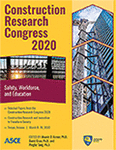Construction Research Congress 2020
Relationships among Dimensions of Human Factors Climate in Construction
Publication: Construction Research Congress 2020: Safety, Workforce, and Education
ABSTRACT
Independently, work preferences have been studied for many years across a variety of disciplines and industries. However, the correlation among these attributes in the construction industry has not been examined. These relationships would help to understand if dimensions of human factors like emotions, fatigue, safety, cognitive demand, job satisfaction, and motivation act independently and discretely, or systematically to improve performance. This paper introduces the concept of human factors (HF) climate for the first time and explores the theoretical relationships among potential dimensions. The HF climate can be defined as the holistic method for studying the perceived psychological, physiological, and emotional impacts of work on human resources. Literature has revealed that most studies examine individual human factors independently and only a few pairwise relationships have been explored. To date, there is no study to examine human factors as a system or climate, although most studies use perception-based surveys and acknowledge that different aspects of human factors do not act in isolation. The goal of the HF climate is to replace the study of one or two dimensions (e.g., safety) at a time and allow us to consider the interrelationships among multiple dimensions simultaneously.
Get full access to this article
View all available purchase options and get full access to this chapter.
REFERENCES
Backs, R. W., Ryan, A. M. and Wilson, G. F. (1994) Psychphysiological measures of workload during continuous manual performance. Human Factors, 36, 514–531.
Bhandari, S., Hallowell, M. R., & Correll, J. (2019). Making construction safety training interesting: A field-based quasi-experiment to test the relationship between emotional arousal and situational interest among adult learners. Safety science, 117, 58-70.
Brown, R. L., and Holmes, H. (1986). The use of a factor-analytic procedure for assessing the validity of an employee safety climate model. Accident Analysis and Prevention, 18(6), 455-470.
Cohen, S., Kamarck, T., and Mermelstein, R. (1983). A global measure of perceived stress. Journal of health and social behavior, 385-396.
Clore, G. L., Schwarz, N., and Conway, M. (1994). Affective causes and consequences of social information processing. Handbook of social cognition, 1, 323-417.
Cranny, C. J., Smith, P. C., and Stone, E. (1992). Job satisfaction: How people feel about their jobs.
Dieleman, M., Cuong, P. V., Anh, L. V., and Martineau, T. (2003). “Identifying factors for job motivation of rural health workers in North Viet Nam.” Human Resources for Health, 1(1).
Dieterly, D. L., and Schneider, B. (1974). The effect of organizational environment on perceived power and climate: A laboratory study. Organizational Behavior and Human Performance, 11(3), 316-337.
Fleishman, E. A. (1953). Leadership climate, human relations training, and supervisory behavior. Personnel psychology, 6(2), 205-222.
Gross, J. J., and Levenson, R. W. (1997). Hiding feelings: the acute effects of inhibiting negative and positive emotion. Journal of abnormal psychology, 106(1), 95.
Hackman, J. R., & Oldham, G. R. (1975). Development of the job diagnostic survey. Journal of Applied psychology, 60(2), 159.
Hart, S. G. (2006, October). NASA-task load index (NASA-TLX); 20 years later. In Proceedings of the human factors and ergonomics society annual meeting (Vol. 50, No. 9, pp. 904-908). Sage CA: Los Angeles, CA: Sage publications.
Hauke, J., & Kossowski, T. (2011). Comparison of values of Pearson's and Spearman's correlation coefficients on the same sets of data. Quaestiones geographicae, 30(2), 87-93.
Jolliffe, I. T. (1986). Principal Component Analysis. 1986. Spring-verlag, New York, 2, 29.
Litwin, G. H., and Stringer, R. A., Jr. (1968). Motivation and organizational climate. Boston: Division of Research, Harvard Business School.
Michielsen, H. J., De Vries, J., & Van Heck, G. L. (2003). Psychometric qualities of a brief self-rated fatigue measure: The Fatigue Assessment Scale. Journal of psychosomatic research, 54(4), 345-352.
Pekrun, R., Goetz, T., Frenzel, A. C., Barchfeld, P., and Perry, R. P. (2011). “Measuring emotions in students’ learning and performance: The Achievement Emotions Questionnaire (AEQ).” Contemporary Educational Psychology, 36(1), 36–48.
Sanders, M. S., & McCormick, E. J. (1998). Human factors in engineering and design. Industrial Robot: An International Journal.
Spector, P. E. (1997). Job satisfaction: Application, assessment, causes, and consequences (Vol. 3). Sage publications.
Tavakol, M., and Dennick, R. (2011). Making sense of Cronbach's alpha. International journal of medical education, 2, 53.
Tixier, A. J. P., Hallowell, M. R., Albert, A., van Boven, L., & Kleiner, B. M. (2014). Psychological antecedents of risk-taking behavior in construction. Journal of Construction Engineering and Management, 140(11), 04014052.
Watson, D., & Tellegen, A. (1985). Toward a consensual structure of mood. Psychological bulletin, 98(2), 219.
Zohar, D. (1980). Safety climate climate in industrial organizations: theoretical and applied implications. Journal of applied psychology, 65(1), 96.
Information & Authors
Information
Published In
Construction Research Congress 2020: Safety, Workforce, and Education
Pages: 289 - 298
Editors: Mounir El Asmar, Ph.D., Arizona State University, David Grau, Ph.D., Arizona State University, and Pingbo Tang, Ph.D., Arizona State University
ISBN (Online): 978-0-7844-8287-2
Copyright
© 2020 American Society of Civil Engineers.
History
Published online: Nov 9, 2020
Published in print: Nov 9, 2020
Authors
Metrics & Citations
Metrics
Citations
Download citation
If you have the appropriate software installed, you can download article citation data to the citation manager of your choice. Simply select your manager software from the list below and click Download.
